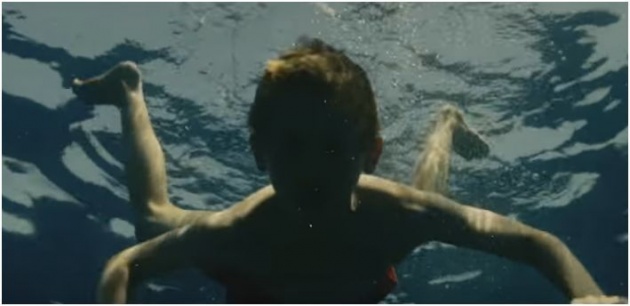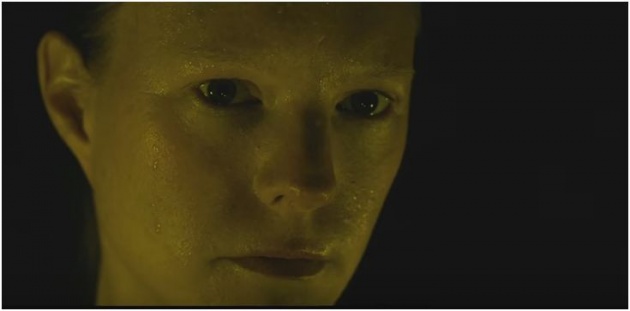
By her own admission, Evolution, the long-awaited second feature film from writer-director Lucile Hadžihalilovic is based on nightmares. Not the kind you or I might have, but ones in which girls (in this case the film director) imagine themselves as boys, boys get pregnant on an island where the only adults are women and no one sees babies after they are born. There is nothing wrong with telling a story based on dream logic, if the dream world is richly imagined. Alas, Evolution is more like a series of cartoons. Indeed, the pre-pubescent protagonist, Nicolas (Max Brebant, aged 13 at time of filming) keeps such a sketch book.
The number of science fiction films directed by women can probably be counted on one hand – Kathryn Bigalow’s Strange Days is the only one that comes to mind without the benefit of a google search. Women’s science fiction literature is best illustrated by Margaret Atwood’s The Handmaid’s Taland (long before it) Mary Shelley’s Frankenstein. Hadžihalilovic’s film has more in common with this literary tradition, but it begins and ends in the water, traditionally a signifier of rebirth and renewal; water dreams also signify life, death and change, though the water formation itself (sea, lake or river) is also significant.
Evolution is not just a difficult second movie, in terms of following Hadžihalilovic’s much admired debut Innocence (2005). It is also a Difficult Second Movie in terms of understanding what it means. The starfish is important. The women have suckers on their back like starfish. There are starfish medical lights. At some point, I was expecting Patrick Star to turn up, though I don’t think Hadžihalilovic ‘does’ popular culture, much less Bob L’Eponge (SpongeBob SquarePants en France).
We first see Nicolas swimming in the sea. Why is there alone? We don’t know. What he sees there is a starfish and a dead body. He runs home and tells his mother about it. Playing with other boys on the rocky beach, one of them doesn’t believe him. A fight follows. Nicolas is given an operation. His belly button is sewn up and he is given an injection. We see another boy with a full belly. A baby is cut out it (though Caesarian section) and then taken away. Who raises the child? At what point is it introduced to the community? We don’t find out.
Nicolas understands that his mother (Julie-Marie Parmentier, with bleached eyebrows) is not his birth mother. He is assisted by a sympathetic nurse (Roxane Duran) who cannot watch the suffering of boys being discarded having given birth without some feeling of compassion.

The best scene involves one of Nicolas’ nocturnal trips ending with the sight of women lying naked on their backs in a star formation moaning and wailing. They make be experiencing erotic pleasure or communicating in a native guttural language like the pod people in Philip Kaufman’s 1978 remake of Invasion of the Body Snatchers. But if the women aren’t human, or possibly a more evolved species, what about the men?
In recent interviews for his Netflix Original Movie, Special Correspondents - not so original, it’s a remake – Ricky Gervais described men as boys and women as the responsible ones. Hadžihalilovic’s film plays out this idea. I’m not sure it is strictly true – irresponsibility is not determined by gender – but the film imagines a status quo where boys are prevented from reaching puberty and women achieve pleasure only in numbers, perhaps giving a new meaning to the title, ‘party of five’.
The film was shot on the Canary Islands, rarely utilised as a location. The director and her director of photography relied on a local cameraman to photograph the remarkable undersea landscape – the undersea world has more colour and variety than the human world above.
Nicolas draws a number of pictures, including a girl with red curly hair – clearly the nurse who helps him escape. There are no exposition scenes, only procedures. There are no weapons either, only syringes.
Hadžihalilovic’s other influences include David Lynch, for the fully-achieved soundscape and David Cronenberg for body horror – The Brood (1979) springs to mind. You might also think of Lost – perhaps the island is a science facility, the boys unaware that they are test subjects. Nicolas’ drawings in a real sense save him – perhaps this is a statement of the redemptive power of art; we understand the world through a depiction of it, and through that depiction adjust. Perhaps the most abiding influence is the opening of Maya Deren’s 1944 experimental short, At Land, in which a grown woman is deposited on a beach by the sea and clambers up to find herself on a dinner table. Deren pursues dream logic – not to mention the reclaiming of a chess piece – more assiduously than Hadžihalilovic. One wonders why Hadžihalilovic did not fully embrace surrealism.
The title refers to the evolution of gender relationships (women and boys) as well as to human form, women far from being mermaids and suited to the sea being rather more clinging to the surface. Hadžihalilovic balances a straightforward narrative – escaping a fate that would lead to death in child birth – with dream ideas, but the narrative holds back on being an exploration of the dream world. There is very little emotional variety. Aside from their nocturnal beach trip, the women don’t experience pleasure. Nor are they delineated as characters, Nicolas’ helper aside.
The final image is of a port – an industrial landscape – in the distance. Perhaps this represents the (suppressed) masculine world of manufacturing and profit. The camera doesn’t advance towards it, but observes it from a significant distance. Perhaps it isn’t escape. Inside Evolution is a perfectly formed surrealist short waiting to get out.
Reviewed at Curzon Soho, Shaftesbury Avenue, Central London, Thursday 28 April 2016, 18:30 (preview) screening. With thanks to Sci Fi Now Magazine and Metrodome



